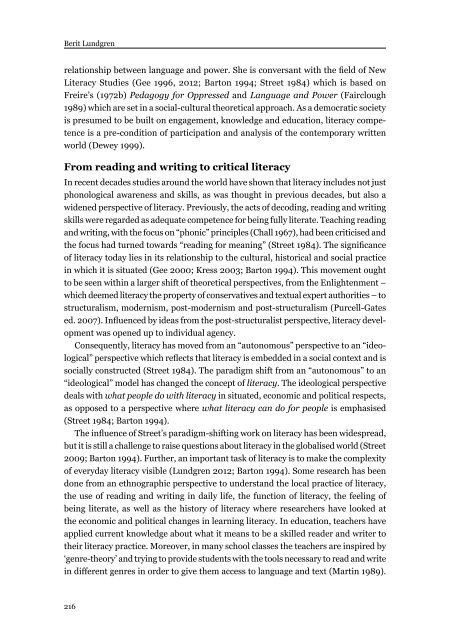Download issue - Umeå universitet
Download issue - Umeå universitet
Download issue - Umeå universitet
Create successful ePaper yourself
Turn your PDF publications into a flip-book with our unique Google optimized e-Paper software.
Berit Lundgren<br />
relationship between language and power. She is conversant with the field of New<br />
Literacy Studies (Gee 1996, 2012; Barton 1994; Street 1984) which is based on<br />
Freire’s (1972b) Pedagogy for Oppressed and Language and Power (Fairclough<br />
1989) which are set in a social-cultural theoretical approach. As a democratic society<br />
is presumed to be built on engagement, knowledge and education, literacy competence<br />
is a pre-condition of participation and analysis of the contemporary written<br />
world (Dewey 1999).<br />
From reading and writing to critical literacy<br />
In recent decades studies around the world have shown that literacy includes not just<br />
phonological awareness and skills, as was thought in previous decades, but also a<br />
widened perspective of literacy. Previously, the acts of decoding, reading and writing<br />
skills were regarded as adequate competence for being fully literate. Teaching reading<br />
and writing, with the focus on “phonic” principles (Chall 1967), had been criticised and<br />
the focus had turned towards “reading for meaning” (Street 1984). The significance<br />
of literacy today lies in its relationship to the cultural, historical and social practice<br />
in which it is situated (Gee 2000; Kress 2003; Barton 1994). This movement ought<br />
to be seen within a larger shift of theoretical perspectives, from the Enlightenment –<br />
which deemed literacy the property of conservatives and textual expert authorities – to<br />
structuralism, modernism, post-modernism and post-structuralism (Purcell-Gates<br />
ed. 2007). Influenced by ideas from the post-structuralist perspective, literacy development<br />
was opened up to individual agency.<br />
Consequently, literacy has moved from an “autonomous” perspective to an “ideological”<br />
perspective which reflects that literacy is embedded in a social context and is<br />
socially constructed (Street 1984). The paradigm shift from an “autonomous” to an<br />
“ideological” model has changed the concept of literacy. The ideological perspective<br />
deals with what people do with literacy in situated, economic and political respects,<br />
as opposed to a perspective where what literacy can do for people is emphasised<br />
(Street 1984; Barton 1994).<br />
The influence of Street’s paradigm-shifting work on literacy has been widespread,<br />
but it is still a challenge to raise questions about literacy in the globalised world (Street<br />
2009; Barton 1994). Further, an important task of literacy is to make the complexity<br />
of everyday literacy visible (Lundgren 2012; Barton 1994). Some research has been<br />
done from an ethnographic perspective to understand the local practice of literacy,<br />
the use of reading and writing in daily life, the function of literacy, the feeling of<br />
being literate, as well as the history of literacy where researchers have looked at<br />
the economic and political changes in learning literacy. In education, teachers have<br />
applied current knowledge about what it means to be a skilled reader and writer to<br />
their literacy practice. Moreover, in many school classes the teachers are inspired by<br />
‘genre-theory’ and trying to provide students with the tools necessary to read and write<br />
in different genres in order to give them access to language and text (Martin 1989).<br />
216

















